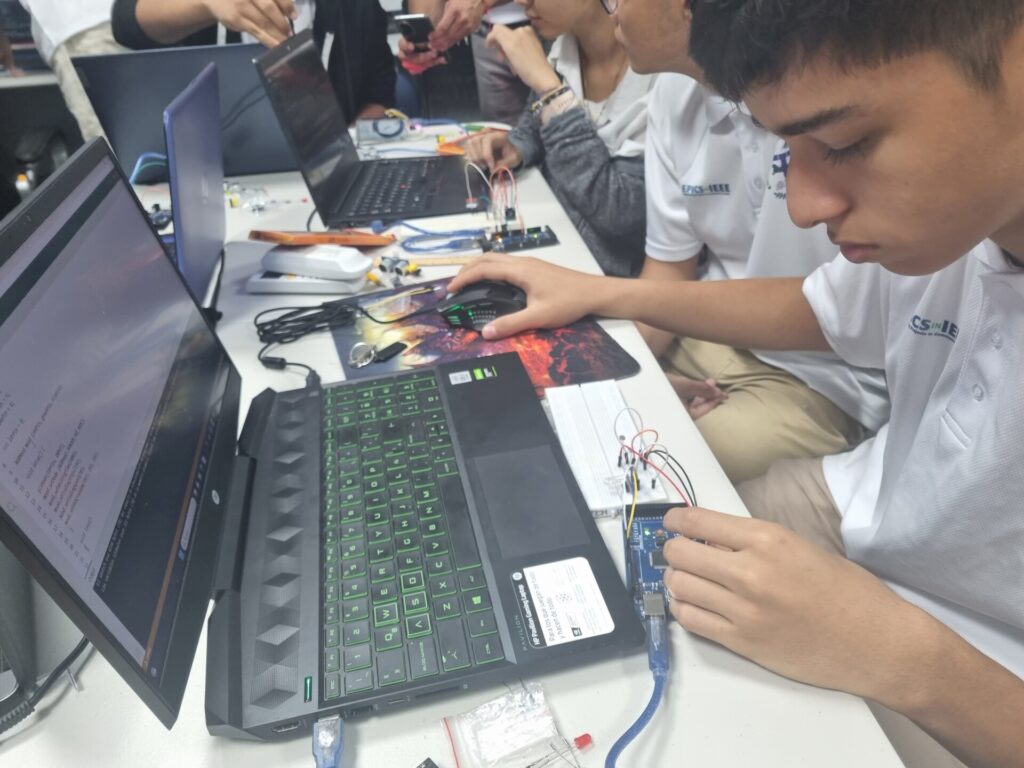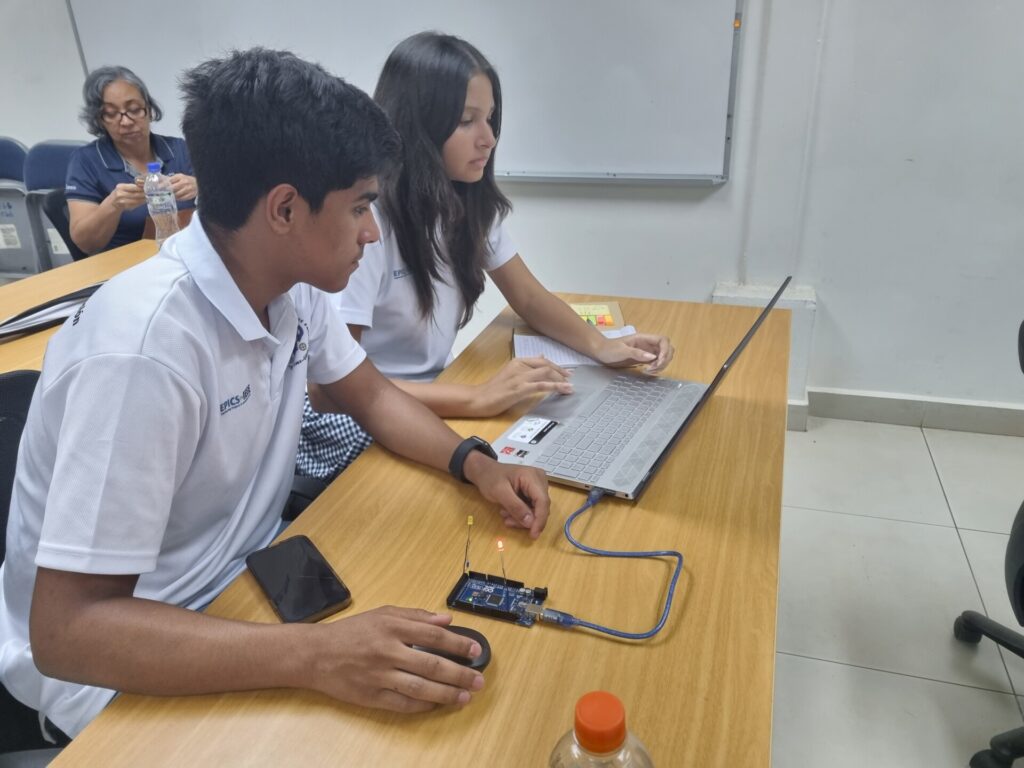In commemoration of EPICS in IEEE’s 15th Anniversary Celebration, Panama-based professor of engineering Victoria Serrano, Ph.D. shares her unique experience as both a Project Lead and EPICS in IEEE Committee Member
For students or teachers, leading a team project that’s been designated as a finalist within EPICS in IEEE’s renowned “Access and Abilities Competition” can be a life-changing process. At the same time, being able to contribute to the EPICS in IEEE Program’s growth and forward motion as an active committee member can be equally transformative.
Victoria Serrano, Ph.D. is in the unique position of having all of these dynamic experiences under her belt.
As a two-time Project Lead – first while she was a Ph.D. candidate in electrical engineering at Arizona State University (ASU) in Tempe, AZ, U.S. in 2015 and more recently as a professor of electrical engineering at the Universidad Tecnológica de Panamá in Chiriquí, Panama in 2023 – as well as a member of the EPICS in IEEE Committee, Dr. Serrano has heartfelt sentiments to share about the enriching learning experiences EPICS in IEEE offers participants and how they’ve positively impacted her and fellow team members.
“The first project I led in 2015, called ‘STEM Beyond the Borders,’ was designed to expose high school students to the exciting projects, challenges, and career opportunities in the field of engineering and empower them with the skills and tools that would enable them to immediately participate in the ongoing robotics revolution, especially in Latin America,” Dr. Serrano shared. The project involved 15 12th-grade students from three different area high schools in Panama and engaged the students through the use of mathematical concepts and Lego EV3 Snakes, whose speed and direction are controllable through experimentation and programming. Following instruction in STEM concepts and team members’ collaboration, students participated in a competition that rewarded the greatest velocity and precision among their Lego EV3 Snakes as they slithered along a curvy path and attacked a target.
 “The goal of the project was to encourage high school students to explore and embrace engineering programs,” Dr. Serrano explained. “At the end of the project, we donated some of the equipment we’d used to the high schools so that students could continue to make use of them and also compete in local science fairs and robotics competitions. Some of these students ended up majoring in engineering at the Universidad Tecnológica de Panamá and, today, eight years later, some are now working engineers!”
“The goal of the project was to encourage high school students to explore and embrace engineering programs,” Dr. Serrano explained. “At the end of the project, we donated some of the equipment we’d used to the high schools so that students could continue to make use of them and also compete in local science fairs and robotics competitions. Some of these students ended up majoring in engineering at the Universidad Tecnológica de Panamá and, today, eight years later, some are now working engineers!”
The second project she led, called “Closing the Gap in Engineering Education for People with Disabilities – Panama” and part of EPICS in IEEE’s “Access and Abilities Competition,” involved 15 undergraduate students from the Universidad Tecnologica de Panama’s engineering departments and 24 students from four different high schools in Chiriquí in activities designed to help enhance autonomy, individual development, and quality of life for people with moderate to severe visual impairment and/or physical disabilities at the university; this was done through the team’s development of everything from auditory information/orientation points and Braille signs using 3D printing to automated doors and design/construction of a customized wheelchair for an individual with physical disabilities.
In 2019, “I was invited to join the EPICS in IEEE Committee and I thought it would be a great opportunity to contribute back to the program,” Dr. Serrano said. “Among other accomplishments, we’ve helped update the EPICS in IEEE website as well as formalize/standardize the EPICS in IEEE project application which students use to propose their projects for grant funding from IEEE.”
Advancing Technology for Humanity
According to Dr. Serrano, one of the most important and far-reaching benefits of the EPICS in IEEE initiative and “Access and Abilities Competition” is the indelible impact these programs have on participants’ outlook, sense of humanity, and desire to uplift others.


“Since our ‘Closing the Gap’ Project, for instance, our student participants are seeing things differently and are much more sensitive to people with disabilities,” she confirmed. “We recently asked the students for their thoughts on the biggest benefits of using Arduino, an open-source electronics platform for building electronic products, and they shared that ‘it can do a lot of things to help people.’ I was so touched by their response and realized that they’d gotten our mission!”
In her travels throughout Latin America’s academic world, Dr. Serrano proudly promotes EPICS in IEEE at conferences and other speaking engagements and has been excited to hear from students who are interested in applying to the program and hearing her tips for project success.
“I want to thank EPICS in IEEE for not only changing the life of our project participants but mine as well,” she said. “I can see the positive results of both the technical information and skills we share with students as well as the transformative impact on their minds and outlook. I think that the concept of using technology to help others has been life-changing for everyone.”
Tune in for more from Dr. Serrano during the upcoming EPICS in IEEE panel on “Best Practices for Service Learning from Past EPICS in IEEE Project Leaders,” during which Dr. Serrano, along with other past EPICS in IEEE project leaders, will share what they’ve learned from proposal to deployment as well as best practices to ensure project success. Register here.
For More Information
For more information on EPICS in IEEE or the opportunity to participate in service learning projects, visit epics.ieee.org. “EPICS (Engineering Projects in Community Service) in IEEE” is an initiative which provides opportunities for students to work proactively with both engineering professionals, technological innovation, and local organizations/partners to develop solutions that address global community challenges. For more information on EPICS in IEEE’s “Access and Abilities Competition” or to apply for a project grant, visit https://epics.ieee.org/get-involved/access-and-abilities-competition/.

Recent Comments